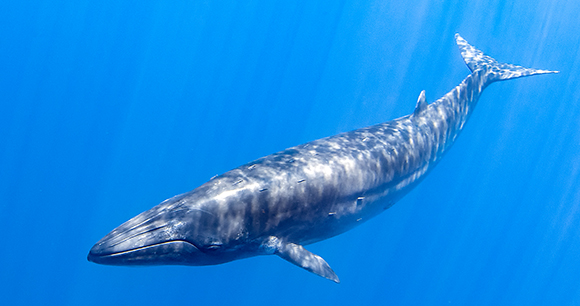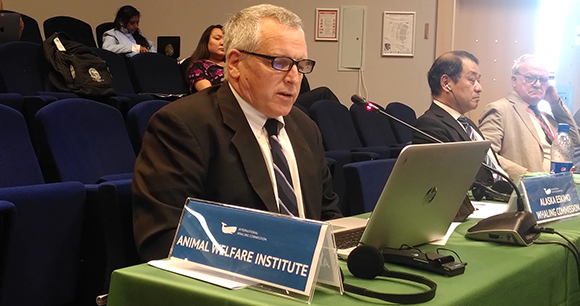Since the International Whaling Commission (IWC) last met in person in 2018, two significant milestones have passed: the 75th anniversary of the IWC’s founding treaty—the International Convention for the Regulation of Whaling (ICRW)—in December 2021 and the 40th anniversary of the decision to prohibit commercial whaling worldwide (known as the moratorium) in July 2022. AWI led efforts among NGOs and governments to commemorate both landmarks—hosting a virtual webinar to observe the ICRW’s 75th anniversary and promote a new vision for the IWC and organizing an in-person event at the United Kingdom venue of the historic 1982 moratorium vote.

Today, the IWC does far more than regulate whaling, and its growing conservation agenda reflects its deep expertise and global reach in mitigating the climate crisis, biodiversity loss, and other anthropogenic threats to cetaceans and the marine environment. But an observer of the 68th IWC meeting, held in Slovenia in October, would have experienced profound cognitive dissonance: During the first days of technical committees and working groups, governments and NGOs advanced the conservation and welfare agenda in productive closed sessions. Days later, the main plenary session degenerated into disarray and recrimination as a small faction of pro-whaling countries disrupted proceedings, prevented decision-making, and blocked progress.
The three remaining commercial whaling nations—Norway, Iceland, and former IWC member Japan—and supporters from small developing countries no longer hold enough votes to overturn the moratorium, but they are adept at exploiting the rules of procedure to cause maximum chaos, and they pose an existential threat to the IWC itself.
Like other international organizations, the IWC is struggling in the current economic climate, with a significant number of member nations behind on their annual contributions. Under the rules of procedure, countries in arrears cannot vote, but IWC68 began with a gesture of support toward those whose financial challenges arose specifically from the COVID-19 pandemic: Voting rights were restored (for this meeting only) to 18 countries that had arrears for 2020, 2021, and/or 2022.
This amnesty—originally proposed by the pro-whaling nations—had the unexpected effect of putting within reach a proposal that has eluded pro-conservation countries for more than two decades. A block of Latin American countries known as the Buenos Aires Group has repeatedly proposed a whale sanctuary in the former industrial whaling grounds of the South Atlantic but has never managed to secure the three-quarters majority vote needed for it to pass. With a number of lapsed conservation votes temporarily restored at IWC68, and several pro-whaling countries not in attendance, this target was achievable for the first time in years and the excitement was palpable.
Sadly, however, pro-whaling nations conspired to scuttle the attempt. Antigua & Barbuda, Benin, Cambodia, Cameroon, Cote d’Ivoire, Guinea, Ghana, Iceland, Kiribati, Laos, Liberia, Mauritania, Morocco, Nauru, Palau, St. Lucia, and Solomon Islands resorted to boycotting the session in which the proposal was discussed. Their absence broke the quorum required for decision-making (attendance by a majority of the 88 IWC members) and prevented the proposal from being approved. Angry recriminations about their undiplomatic behavior endured for the remaining day of the meeting and set the tone for some very difficult discussions on other agenda items.
Two proposals that needed only a simple majority to pass were submitted by pro-whaling countries. Antigua & Barbuda proposed to overturn the whaling moratorium and restart a process, abandoned 15 years ago, to replace the ban with a new whaling management regime. It also—along with Gambia, Guinea, and Cambodia—offered a resolution promoting whaling as a solution to global food insecurity. Neither resolution could secure the votes needed to pass, but their voluble proponent ensured that they occupied hours of meeting time. Ultimately, it was agreed that the proposals would be discussed intersessionally and reintroduced at the next IWC meeting in 2024.
It is rare for budget discussions at international meetings to be dramatic cliffhangers, but the IWC is in a dire financial situation and desperately needed to adopt a budget to ensure it would survive until its next meeting, especially as income from membership fees was not keeping pace with rising inflation. We feared another pro-whaling nation walkout on the last day would prevent the IWC from adopting a budget, but a compromise was eventually reached. Fees were increased only for the richest members and cuts were made to secretariat services and meeting expenses.

Ultimately, while IWC68 was a disappointment, it was not a disaster: The moratorium remains intact, the IWC has enough funds for its critical intersessional work, and it agreed to several useful operational changes and financial reforms. The IWC adopted, by consensus, a resolution on marine plastics that will facilitate more collaborative work on this critical global threat to cetaceans, created a climate change work stream in the Conservation Committee where mitigation initiatives will be developed, and endorsed the use of a Whale Welfare Assessment Tool to better understand—and avoid—the impacts of a range of human activities on cetaceans. The IWC also endorsed a joint initiative of the Conservation and Scientific committees to address the growing problem of cetacean species facing extinction and expressed concern for critically endangered species such as the vaquita, Maui dolphin, and North Atlantic right whale.
AWI’s team at the IWC was active across all these issues on the agenda, often providing research and technical advice to governments making difficult decisions. We were also pleased to contribute more than $30,000 in voluntary funding to support the IWC’s conservation and welfare work, especially for small cetaceans and bycatch mitigation.
The IWC’s two recent anniversaries have prompted reflection on the global significance of the IWC and its vital moratorium on commercial whaling, and they offer an important lesson in taking a long view when addressing global conservation issues while reacting urgently to immediate threats. As we look ahead to IWC69—to be held in Lima, Peru—we will work with likeminded NGOs and governments on a plan to prevent a repeat of the chaos of IWC68, protect the moratorium, and, hopefully, finally secure a South Atlantic whale sanctuary.